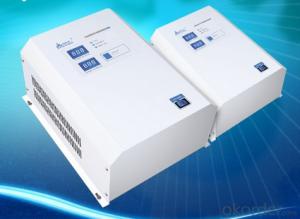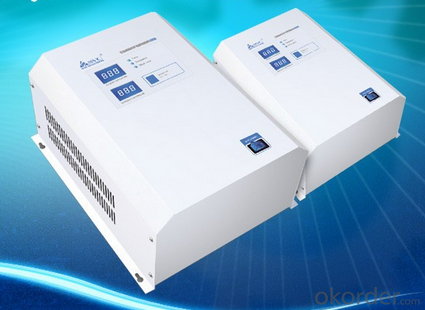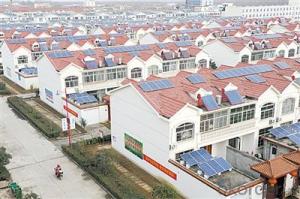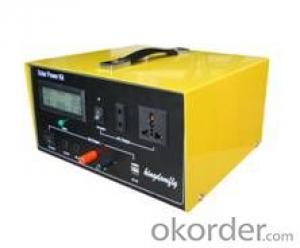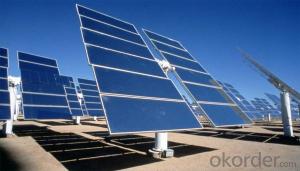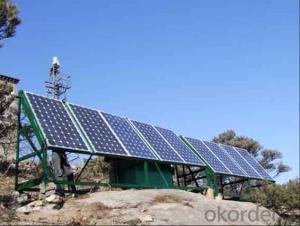Redsun Solar Energy Systems Voltage Regulator/Home SVC Wall Mount 3000VA 220V AC
- Loading Port:
- China main port
- Payment Terms:
- TT OR LC
- Min Order Qty:
- 100 carton
- Supply Capability:
- 10000 carton/month
OKorder Service Pledge
OKorder Financial Service
You Might Also Like
Home SVC Wall Mount 3000Va 220V AC Voltage Regulator
 Feature
Feature
1. Microprocessor control guarantees high reliability
2. Short Circuit, Overload, Over temperature protections provides safe and reliable performance
3. Delay function can protect the refrigerator, air conditioner and other household electrical appliances when the AC
switch frequently.
4. High voltage cut-off.
Field of Application
Applicable for equipment of computer network, household electrical appliances, medical equipment, scientific research
institutions, measuring and test equipment,calibration stand in factory, etc.

| MODEL | AVR-BG4060 | AVR-BG4100 | AVR-BG4150 | AVR-BG4200 | AVR-BG4300 | AVR-BG4500 |
| Rated Power | 600VA | 1000VA | 1500VA | 2000VA | 3000VA | 5000VA |
| TECHNOLOGY | ||||||
| Technology | CPU based digital circuit+Transformer+Relays | |||||
| Efficiency | 98% | |||||
| Phase | Single | |||||
| INPUT | ||||||
| Input voltage | 140~280 Vac | |||||
| Input Frequency | Same As AC | |||||
| OUTPUT | ||||||
| Output voltage | 220Vac±10% | |||||
| DISPLAY | ||||||
| Led Digital Display Status | Input Voltage, Output Voltage | |||||
| Led Display Status | Normal, Display,Fault | |||||
| PROTECTION | ||||||
| Protections | High/Low Voltage, Overload, High Temperature,Short Circuit | |||||
| PHYSICAL | ||||||
| Unit dimention (mm) | 180*174*104 | 220*184*104 | 274*222*128 | |||
| Net weight (kg) | 2.5 | 3.2 | 3.8 | 6.2 | 7.4 | 8.8 |
| ENVIRONMENT | ||||||
| Environment of performance | Temperature 0℃~40℃, Humidity 20%~90% | |||||
| Noise level | <40db(lm)< td=""> | |||||
| Product specification are subject to change without notice | ||||||
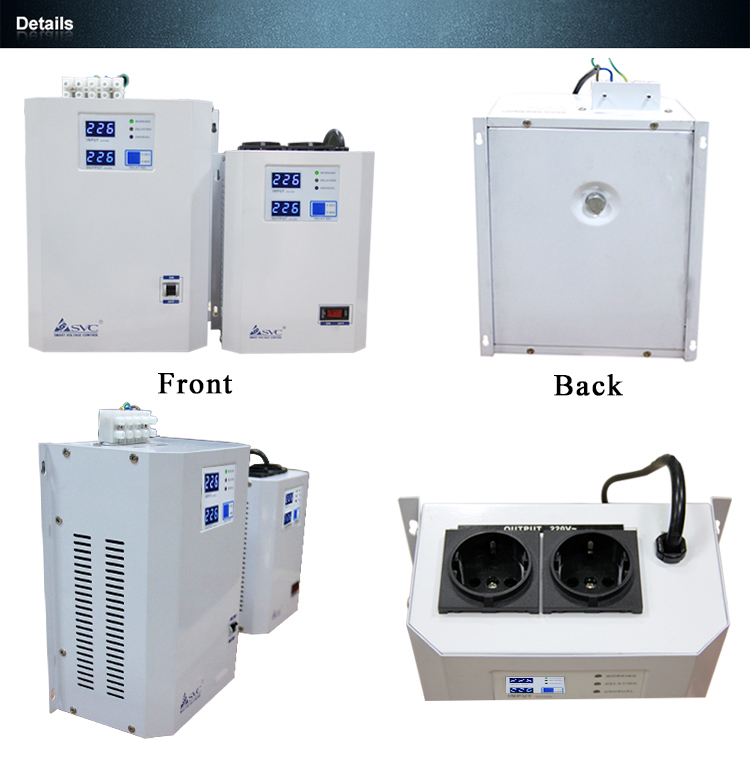
- Q: Can solar energy systems be used in areas with high levels of wildlife activity?
- Yes, solar energy systems can be used in areas with high levels of wildlife activity. While it is true that wildlife can pose some challenges for solar energy systems, there are several ways to mitigate these issues. One of the primary concerns is the risk of damage to the solar panels by large animals or birds. However, there are various protective measures that can be taken to prevent this. For instance, installing fencing or barriers around the solar panels can help keep wildlife away. Additionally, using anti-reflective coatings on the panels can reduce the likelihood of bird collisions. Another concern is the impact of solar energy systems on wildlife habitats. It is crucial to choose the location of the solar panels carefully, considering the existing wildlife activity in the area. By conducting thorough environmental impact assessments and engaging with local wildlife experts, it is possible to minimize any potential negative effects on wildlife habitats. Moreover, solar energy systems can actually benefit wildlife in some cases. For example, solar farms can provide additional shelter and shade for some species, and the open spaces underneath the panels can create new habitats for ground-dwelling animals. Overall, while there may be some challenges, with proper planning and mitigation strategies, solar energy systems can be successfully utilized in areas with high levels of wildlife activity.
- Q: How do solar energy systems contribute to reducing peak demand on the electrical grid?
- Solar energy systems contribute to reducing peak demand on the electrical grid in several ways. Firstly, during sunny days, these systems generate electricity from the sun, which can be directly used by homes and businesses, reducing their reliance on the grid. This decreases the overall demand on the grid during peak times. Additionally, excess solar energy generated during the day can be stored in batteries or fed back into the grid, providing a supplemental power source during peak demand periods. This helps to balance the load on the grid and reduces strain on conventional power plants, leading to a more stable and reliable electrical grid.
- Q: Are there any risks of electrical surges or voltage fluctuations with solar energy systems?
- Yes, there are potential risks of electrical surges or voltage fluctuations with solar energy systems. While solar panels themselves do not generate surges or fluctuations, the integration of solar energy systems with the existing electrical grid can create certain challenges. One risk is that sudden changes in sunlight intensity can result in voltage fluctuations. For example, when a cloud passes over a solar panel, the sudden decrease in sunlight can cause a drop in voltage output. Similarly, when the cloud passes, the sudden increase in sunlight can cause a surge in voltage output. These fluctuations can potentially affect the stability of the electrical grid. Another risk is related to the inverters used in solar energy systems. Inverters convert the direct current (DC) produced by solar panels into alternating current (AC), which is compatible with the electrical grid. Inverter failure or malfunction can lead to voltage fluctuations or surges, which can damage electrical equipment or disrupt the electrical supply. To mitigate these risks, solar energy systems are usually equipped with protective devices like surge protectors and voltage stabilizers. Surge protectors help prevent voltage spikes by diverting excess energy away from the system, while voltage stabilizers regulate voltage levels to ensure a steady and safe supply of electricity. Moreover, proper installation and regular maintenance of solar energy systems are crucial to minimize the risks of electrical surges or voltage fluctuations. Qualified professionals should handle the installation process, ensuring that all components are correctly connected and grounded. Routine inspections and maintenance checks can help identify and address any issues before they escalate into serious problems. Overall, while solar energy systems offer numerous benefits, it is important to be aware of and address the potential risks associated with electrical surges or voltage fluctuations. By implementing appropriate protective devices, following proper installation and maintenance procedures, and working with qualified professionals, these risks can be effectively managed, ensuring the safe and reliable operation of solar energy systems.
- Q: How do solar energy systems impact grid stability?
- Solar energy systems can have both positive and negative impacts on grid stability. On one hand, solar power can help enhance grid stability by reducing the strain on traditional power plants and diversifying the energy mix. Solar energy is typically generated during the day when demand is high, which can help meet peak demand and stabilize the grid. On the other hand, the intermittent nature of solar power can present challenges to grid stability, as it is dependent on weather conditions. This intermittency can lead to fluctuations in power generation, which may require additional grid management strategies and energy storage solutions to ensure stability.
- Q: How does the efficiency of solar panels vary based on the cleanliness?
- The efficiency of solar panels does vary based on cleanliness. When solar panels are clean and free from dirt, dust, and debris, they are able to absorb more sunlight and convert it into electricity more effectively. On the other hand, if solar panels are dirty or covered in grime, their efficiency decreases as the dirt blocks the sunlight and reduces the amount of energy that can be generated. Therefore, regular cleaning and maintenance of solar panels is essential to ensure optimal efficiency and maximum energy production.
- Q: Can solar energy systems generate power at night?
- No, solar energy systems cannot generate power at night because they rely on sunlight to generate electricity.
- Q: Can a solar energy system be installed in a remote location without access to the electrical grid?
- Indeed, it is possible to install a solar energy system in a distant area that lacks access to the electrical grid. Solar power systems employ photovoltaic (PV) panels to transform sunlight into electricity. Even if these panels are situated far away from the electrical grid, they can still be established in locales with ample sunlight. In such instances, an off-grid solar energy system can be utilized. This system consists of solar panels, a battery bank, and an inverter. The solar panels amass sunlight and convert it into electrical energy. This energy is then stored in the battery bank for usage during nighttime or cloudy days when sunlight is not readily accessible. The inverter is employed to convert the stored DC (direct current) power from the batteries into AC (alternating current) power, which is the standard form of electricity used in homes and buildings. Off-grid solar systems are frequently employed in remote areas like cabins, campsites, and rural regions where connecting to the grid is not practical or cost-effective. These systems offer a dependable and sustainable source of energy, reducing reliance on traditional generators powered by fossil fuels or other energy sources. Furthermore, solar energy is a clean and renewable source, rendering it an environmentally conscious choice. Although installing a solar energy system in a remote location without access to the electrical grid may present more challenges and expenses compared to grid-connected systems, the long-term advantages and energy independence make it a feasible solution.
- Q: Can solar energy systems be used in areas prone to hurricanes or tornadoes?
- Yes, solar energy systems can be used in areas prone to hurricanes or tornadoes. However, special considerations need to be taken to ensure the durability and resilience of the system. This includes using stronger mounting structures, reinforced frames, and impact-resistant materials. Additionally, regular maintenance and inspection are crucial to identify and address any potential damages caused by severe weather events.
- Q: Can solar energy systems be used during power outages?
- Yes, solar energy systems can be used during power outages. However, it depends on the type of solar energy system being used. Grid-tied solar systems without battery storage are designed to shut down during power outages to prevent electricity from being fed back into the grid and endangering utility workers. On the other hand, solar energy systems with battery storage, commonly known as solar-plus-storage systems, can provide electricity during power outages by utilizing the energy stored in the batteries.
- Q: How do solar energy systems impact the overall sustainability of a home?
- Solar energy systems have a significant impact on the overall sustainability of a home. Firstly, they greatly reduce dependence on fossil fuels, which are finite and contribute to climate change. By harnessing the power of the sun, solar energy systems generate clean, renewable electricity that doesn't produce harmful emissions or pollutants. This not only helps to mitigate climate change but also improves air quality in the surrounding environment. Furthermore, solar energy systems provide homeowners with energy independence and resilience. By generating their own electricity, homeowners can reduce their reliance on the grid and avoid the volatility of energy prices. This can lead to long-term cost savings and greater financial stability. Additionally, during power outages or natural disasters, solar energy systems with battery storage can provide a reliable source of electricity, ensuring essential appliances and systems keep running. Solar energy systems also increase the energy efficiency of a home. By supplementing or replacing traditional energy sources, these systems reduce the overall energy consumption of a household. This, in turn, lowers utility bills and conserves resources. Moreover, the installation of solar panels can increase the value of a home. As renewable energy becomes more popular and desirable, potential homebuyers are increasingly willing to pay a premium for properties with solar energy systems. This not only benefits homeowners who are looking to sell their homes but also contributes to the overall growth and adoption of sustainable energy solutions. Lastly, solar energy systems promote a sense of environmental stewardship and sustainability. By utilizing renewable energy, homeowners can actively contribute to reducing their carbon footprint and preserving the planet for future generations. This commitment to sustainability extends beyond the household, inspiring others to embrace clean energy and work towards a greener future. In conclusion, solar energy systems have a positive and far-reaching impact on the overall sustainability of a home. They reduce dependence on fossil fuels, increase energy efficiency, provide energy independence and resilience, boost property value, and promote environmental stewardship. By harnessing the power of the sun, solar energy systems pave the way for a more sustainable and resilient future.
Send your message to us
Redsun Solar Energy Systems Voltage Regulator/Home SVC Wall Mount 3000VA 220V AC
- Loading Port:
- China main port
- Payment Terms:
- TT OR LC
- Min Order Qty:
- 100 carton
- Supply Capability:
- 10000 carton/month
OKorder Service Pledge
OKorder Financial Service
Similar products
Hot products
Hot Searches
Related keywords
